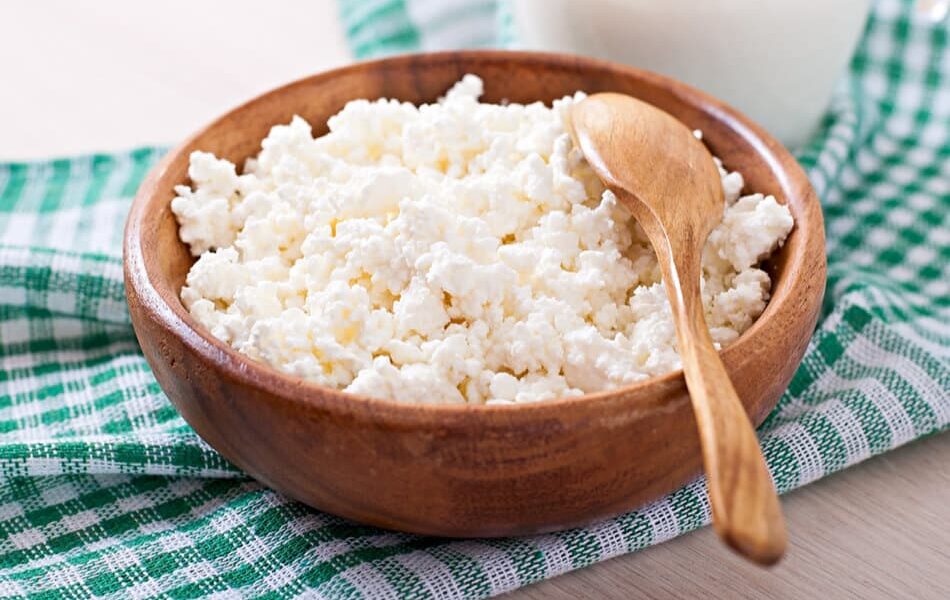Is Cottage Cheese Good for Weight Loss? Benefits and Types
Bodybuilders and nutritionists love cottage cheese for a reason. This article will help you know if cottage cheese is good for weight loss, its benefits, and some common sense tips to help you on your weight loss journey.

Cottage cheese is one of the most popular dairy products in America. It’s a staple in many people’s diets because it’s low in fat, high in protein and other nutrients, and very affordable.
But cottage cheese isn’t just for people trying to lose weight or maintain their weight — anyone who wants to add more protein to their diet can use it as well.
The Dietary Guidelines for Americans 2010 recommend serving 3 cups of dairy products or fortified soy products, to adults who consume 1,600 to 3,200 calories daily.
So how does this dairy food help with weight loss? We will discuss this and more.
Is Cottage Cheese Good for Weight Loss?
Cottage cheese can help you lose weight by keeping you feeling full. It’s an excellent source of protein and calcium and contains other vitamins, minerals, and nutrients. It’s low in calories, making it an ideal snack for weight loss.
Calories are the essential factor in weight loss. Your calorie intake should be lower than you burn every day to lose weight. According to the USDA, 100 grams of nonfat cottage cheese contain 70 calories, which is ideal for anyone on a low-calorie diet. This can help you get to your weight loss goal quickly.
Rich in protein, cottage cheese contains casein, like whey protein found in other dairy foods like yogurt, buttermilk, and kefir. Casein protein helps maintain muscle mass during weight loss by helping you feel full longer between meals. It may also help improve your body’s response to insulin after eating carbohydrates.
A 100g serving of full fat cottage cheese has 11g of protein, low-fat cottage cheese contains 11g, and a nonfat serving contains 13g. 25 to 30g of protein may be ideal for appetite control and weight loss.
It’s also rich in calcium, which plays an essential role in muscle development because it supports muscle contractions and prevents muscle cramps during exercise. The general recommendation is to consume 1,000 mg -1,200 mg of calcium per day for men and women, depending on age.
Cottage cheese also has a low glycemic index (GI) score of 30, which helps to keep the blood sugar levels stable. This makes it ideal for people with diabetes or prediabetes trying to lose weight.
What is Cottage Cheese?
Cottage cheese is a soft, unripened cheese made by adding a bacterial culture to warmed milk. The bacteria convert the lactose into lactic acid, giving the cheese its characteristic sour taste.
It is made from the curds of cow’s milk. The curds are strained in a cheesecloth and then packed into molds. Some cottage cheeses are made with whole milk, while others are made with skimmed or low-fat milk.
Cottage cheese comes in various types, including buttermilk, low-fat, and non-fat varieties. Some brands also offer flavored options such as strawberry, blueberry, or plain. All types are generally packaged in 8-ounce containers or larger tubs with resealable lids.
However, adding flavors can change the nutrients you get from the plain variety (including added sugars).
Cottage cheese has a mild flavor, which goes well with many other foods. It can be mixed with berries such as strawberries or blueberries, nuts like walnuts or almonds, savory ingredients like tomatoes and basil leaves, or even be combined with ricotta cheese to make a healthier lasagna for a gourmet twist on this classic dish.
Does Cottage Cheese Cause Constipation?
Cottage cheese in large quantities can constipate you. Researchers have found that excess dairy consumption can cause constipation so if you overeat dairy foods, high in fat content, and your diet is not balanced, then the probabilities of getting constipation are high.
However, if your diet has a moderate consumption of cottage cheese and you eat fiber-rich foods such as vegetables, fruits, and whole grains, then you’re not likely to get constipated. The recommended daily intake (RDI) of fiber is 25g – 38g depending on your age and sex.
Also, keep yourself fully hydrated, as dehydration promotes constipation. Drinking enough water will help ease constipation, bloating, and other digestive issues.
4 Amazing Benefits of Cottage Cheese for Weight Loss
Cottage cheese is a good source of protein, calcium, and other nutrients. Here are some of its benefits for weight loss:
#1 Good source of protein
Cottage cheese contains about 11 grams of protein per cup (100 grams), making it one of the best protein sources. Protein helps build and repair muscles, which helps you burn more calories during exercise.
Cottage cheese also contains casein, another type of protein found in dairy foods like milk, curds, and cheese. Casein protein has been shown to suppress appetite for up to four hours after consumption.
#2 Inexpensive and convenient
Cottage cheese costs less than $3 per serving (4 ounces), making it one of the cheapest dairy products. It’s also a convenient diet.
To enhance its flavor, you can eat it plain or add seasonings such as herbs, spices, or garlic salt. Add fruit to make it sweeter, or sprinkle on nuts for crunchiness and extra fiber.
#3 Source of calcium
Cottage cheese is an excellent source of calcium, which helps maintain strong bones and teeth. The calcium content can also help prevent constipation and other gastrointestinal problems.
Maintaining strong, healthy bones is crucial to follow a consistent and long-term workout program.
#4 Aids in digestion
Cultured cottage cheese is a rich source of probiotics. It can help improve digestion by producing good bacteria. It also contains many active cultures, such as L. acidophilus and B. bifidum, suitable for gut health and the digestive tract.
Which Cottage Cheese is Best for Weight Loss?
It’s important to note that not all cottage cheeses are created equal. Some have better health benefits than others, and some may be more helpful for your weight-loss goals than others.
Here are a few things to look for:
#1 Low-fat cottage cheese
The best type of cottage cheese that has impacted weight-loss diets is low-fat options that have less than 2 grams of fat per serving. This will still provide you with plenty of protein without adding too many extra calories to your diet.
#2 Nonfat cottage cheese
This type of cottage cheese is free from fat, making it an ideal dairy food for people watching their weight or trying to lose weight. It contains about 20 percent fewer calories than regular cottage cheese. It’s also lower in saturated fat and cholesterol, which makes it better for your heart health and your waistline.
#3 Cottage cheese without additives
Some brands contain added ingredients like whey protein concentrates, carrageenan, or modified food starch to improve texture and consistency. Others have herbs or other flavorings added during processing for taste appeal. These ingredients aren’t harmful, but they add calories that may not be necessary when you’re trying to lose weight.
FAQs
You should consume no more than 3 servings per day. Each serving should contain 42 grams of cottage cheese. Try to consume at least one serving per day.
Eating too much cottage cheese can lead to weight gain, constipation, indigestion, and elevated blood pressure and cholesterol levels. You’re also more likely to develop cardiovascular disease.
Like any other food, cottage cheese can be fattening if you have it in excess. However, as part of a weight-loss diet, you can lose weight by eating moderate amounts of low-fat options.
A word from Our Nutritionist
Cottage cheese has long been a healthy choice. Like other dairy foods, it’s rich in calcium, vitamin B12, Vitamin D, and zinc, but it offers an incredible amount of protein while being low in calories. This makes it ideal for anyone looking to limit the amount of dairy in their diet without skimping on nutrients.
When on a weight loss journey, avoid highly processed cheeses like American cheese, cheddar, and cream cheese, as they’re often highly processed, lowering their nutritional value.
Like all foods, cottage cheese may cause certain side effects in some people. In rare cases, it may be associated with constipation. This occurs when you overeat or if you don’t consume enough fiber in your diet.
If you have trouble with constipation and think that cottage cheese may be contributing to this, try increasing your intake of fruits and vegetables, or adding more fiber to your weight-loss diet through whole grains and drinking enough water.
Conclusion
Cottage cheese is a low-fat, low-calorie, creamy, and soft cheese that has been consumed since ancient times. It’s high in protein and minerals and low in fat.
Depending on the type of cottage cheese you use, you can add it to your salads, for example, chicken salad, main dishes, desserts, or use it as a spread or snack.
Eating cottage cheese without sufficient fiber, fresh fruits and vegetables, and fluids can contribute to constipation. Ensure you add fiber and fruits to your diet and drink a lot of fluids to avoid constipation.
And if you’re a lover of dairy products and are looking for the best options to lose weight, consider adding cottage cheese to your diet for the best results.

















































 Select your language:
Select your language: 








